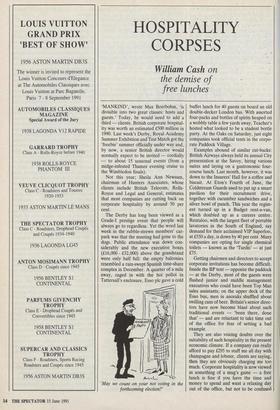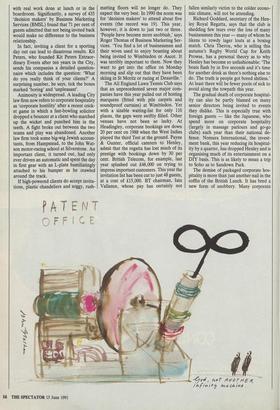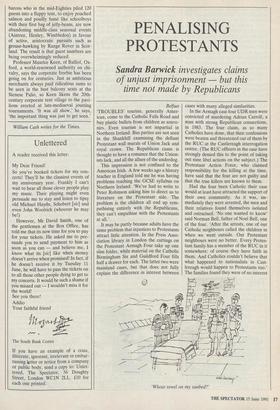HOSPITALITY CORPSES
William Cash on
the demise of free lunches
'MANKIND', wrote Max Beerbohm, 'is divisible into two great classes: hosts and guests.' Today, he would need to add a third — clients. British corporate hospital- ity was worth an estimated £500 million in 1990. Last week's Derby, Royal Academy Summer Exhibition and Test Match got the 'freebie' summer officially under way and, by now, a senior British director would normally expect to be invited — cordially — to about 15 seasonal events (from a midge-infested Thames evening cruise to the Wimbledon finals).
Not this year; Sheila Ann Newsum, chairman of Hunters Associates, whose clients include British Telecom, Rolls- Royce and Legal and General, estimates that most companies are cutting back on corporate hospitality by around 50 per cent.
The Derby has long been viewed as a Grade-I prestige event that people will always go to regardless. Yet the word last week in the rubble-strewn members' car- park was that the meeting had gone to the dogs. Public attendance was down con- siderably and the new executive boxes (£16,000 - £32,000) above the grandstand were only half full: the empty balconies resembled a rain-swept Spanish time-share complex in December. A quarter of a mile away, caged in with the hoi polloi in Tattersall's enclosure, Esso plc gave a cold 'May we count on your not voting in the forthcoming election?' buffet lunch for 40 guests on board an old double-decker London bus. With assorted four-packs and bottles of spirits heaped on a wobbly table a few yards away, Teacher's hosted what looked to be a student bottle party. At the Oaks on Saturday, just eight companies took official tents in the corpo- rate Paddock Village.
Examples abound of similar cut-backs: British Airways always held its annual City presentation at the Savoy, hiring various suites and laying on a gastronomic four- course lunch. Last month, however, it was down to the Insurers' Hall for a coffee and biscuit. At Eton's Fourth of June, the Coldstream Guards used to put up a smart pavilion for their recruitment drive, together with cucumber sandwiches and a silver bowl of punch. This year the regim- ent turned up in a Budget rent-a-van, which doubled up as a careers centre. Rentaloo, with the largest fleet of portable lavatories in the South of England, say demand for their acclaimed VIP Superloo, at £550 a day, is down by 40 per cent. Many companies are opting for single chemical toilets — known as the `Turdis' — at just £75.
Getting chairmen and directors to accept corporate invitations has become difficult. Inside the BP tent — opposite the paddock — at the Derby, most of the guests were flushed junior and middle management executives who could have been Top Man sales assistants; on the upper deck of the Esso bus, men in anoraks shuffled about swilling cans of beer. Britain's senior direc- tors have now become blasé about such traditional events — 'been there, done that' — and are reluctant to take time out of the office for fear of setting a bad example.
They are also voicing doubts over the suitability of such hospitality in the present economic climate. If a company can really afford to pay £295 to stuff me all day with champagne and lobster, clients are saying, then they are obviously charging me too much. Corporate hospitality is now viewed as something of a mug's game — a free lunch is fine if you have the time and money to spend and want a relaxing day Out of the office, but not to be confused with real work done at lunch or in the boardroom. Significantly, a survey of 435 `decision makers' by Business Marketing Services (BMSL) found that 71 per cent of guests admitted that not being invited back would make no difference to the business relationship.
In fact, inviting a client for a sporting day out can lead to disastrous results. Kit Peters, who founded Kit Peters Extraor- dinary Events after ten years in the City, sends his companies a detailed question- naire which includes the question: 'What do you really think of your clients?' A surprising number, he says, tick the boxes marked 'boring' and 'unpleasant'.
Animosity is widespread. A leading City law firm now refers to corporate hospitality as 'corporate hostility' after a recent crick- et game in which a fast-bowling solicitor dropped a bouncer at a client who marched up the wicket and punched him in the teeth. A fight broke out between the two teams and play was abandoned. Another law firm took some big-wig Jewish accoun- tants, from Hampstead, to the John Wat- son motor-racing school at Silverstone. An important client, it turned out, had only ever driven an automatic and spent the day in first gear with an L-plate humiliatingly attached to his bumper as he crawled around the track.
If high-powered clients do accept invita- tions, Plastic chandeliers and soggy, rush- matting floors will no longer do. They expect the very best. In 1990 the norm was for 'decision makers' to attend about five events (the record was 19). This year, however, it is down to just two or three. 'People have become more snobbish,' says Roger Thomas of Business Marketing Ser- vices. 'You find a lot of businessmen and their wives used to enjoy boasting about being invited to Wimbledon or Ascot. It was terribly important to them. Now they want to get into the office on Monday morning and slip out that they have been skiing in St Moritz or racing at Deauville.'
The All England Lawn Tennis Club says that an unprecedented seven major com- panies have this year pulled out of hosting marquees (fitted with pile carpets and soundproof curtains) at Wimbledon. Yet with a sizable waiting-list for only 110 places, the gaps were swiftly filled. Other venues have not been so lucky. At Headingley, corporate bookings are down 20 per cent on 1988 when the West Indies played the third Test at the ground. Payne & Gunter, official caterers to Henley, admit that the regatta has lost much of its prestige with bookings down by 30 per cent. British Telecom, for example, last year splashed out £48,000 on trying to impress important customers. This year the invitation list has been cut to just 48 guests, at a cost of £15,000. BT chairman, lain Vallance, whose pay has certainly not fallen similarly victim to the colder econo- mic climate, will not be attending.
Richard Goddard, secretary of the Hen- ley Royal Regatta, says that the club is shedding few tears over the loss of many businessmen this year — many of whom he likens to rowdy lager louts at a boxing match. Chris Therou, who is selling this autumn's Rugby World Cup for Keith Prowse, has a personal theory as to why Henley has become so unfashionable: 'The boats flash by in five seconds and it's time for another drink as there's nothing else to do. The truth is people got bored shitless.' At least there will be fewer pools of sick to avoid along the towpath this year.
The gradual death of corporate hospital- ity can also be partly blamed on many senior directors being invited to events they dislike. This is especially true with foreign guests — like the Japanese, who spend more on corporate hospitality (largely in massage parlours and go-go clubs) each year than their national de- fence. Nomura International, the invest- ment bank, this year reducing its hospital- ity by a quarter, has dropped Henley and is organising much of its entertainment on a DIY basis. This is as likely to mean a trip to Soho as to Sandown Park.
The demise of packaged corporate hos- pitality is more than just another nail in the coffin of the British Lunch. It has bred a new form of snobbery. Many corporate barons who in the mid-Eighties piled 120 guests into a flappy tent, to enjoy poached salmon and pouilly fume like schoolboys with their first bag of jelly-beans, are now abandoning middle-class seasonal events (Aintree, Henley, Wimbledon) in favour of active, aristocratic pursuits such as grouse-hawking by Range Rover in Scot- land. The result is that guest numbers are being overwhelmingly reduced.
Professor Maurice Keen, of Balliol, Ox- ford, a world-renowned authority on chi- valry, says the corporate freebie has been going on for centuries. Just as ambitious merchants always paid ridiculous sums to be seen in the best balcony seats at the Sienese Palio, so Keen likens the 20th- century corporate tent village to the pavi- lions erected at late-mediaeval jousting tournaments. 'It was all show,' he says, 'the important thing was just to get seen.'
William Cash writes for the Times.




















































 Previous page
Previous page